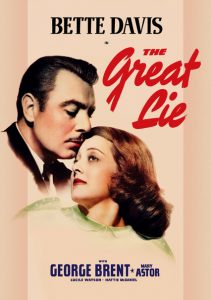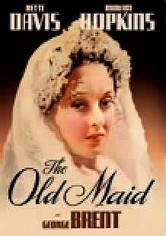The Great Lie-1941
Director Edmund Goulding
Starring Bette Davis, Mary Astor
Scott’s Review #891
Reviewed April 28, 2019
Grade: B+
Breezing into her heyday of films at this point, Hollywood starlet Bette Davis had become an expert at portraying tarts and bitches in most of her movies. Desiring to turn left of center and play a more sympathetic character, the actress jumped at the chance to play an ingenue.
The Great Lie (1941) is the perfect showcase for her talents in a gripping, dramatic film that is purely predictable soap opera, but lovely escapism did well.
Maggie Patterson (Davis) is a demure and sensitive southern socialite vying for the affections of former beau, aviator Peter Van Allen (George Brent). Peter impulsively married sophisticated concert pianist Sandra Kovak (Mary Astor), and both were startled to learn that their marriage was invalid.
Confused, Peter decides to marry Maggie and is quickly sent off to Brazil on business when his airplane crashes into the jungle, leaving him presumed dead.
When Sandra realizes she is pregnant, Maggie proposes that she be allowed to raise the child independently in exchange for financially caring for Sandra. The two women go to Arizona to await the birth, and Sandra delivers a boy named after his father.
When Peter shows up alive and well, the women face a quandary. Sandra bitterly announces to Maggie that she intends to ride off into the sunset with Peter and her son. For the remainder of the picture, the women metaphorically scratch and claw at each other.
Despite being melodramatic and stellar for an afternoon daytime drama, the storyline is engaging and never suffers from too much contrivance.
Both Maggie and Sandra have appeal, and both women are likable—or at least the film does its best not to make one woman the clear villain. Sandra, dripping with gorgeous fashion and sturdy poise, is confident, pairing well with Maggie’s southern charm and sensibilities—to say nothing of her wealth. Peter would do well with either woman, and I found my allegiances shifting throughout the film.
Mary Astor’s terrific performance as Sandra nearly upstages Davis. The women are the reason for The Great Lie’s grit and gusto. They play the hell out of their roles, and according to legend, both hated the script and vowed to turn the project into gold together.
They nearly succeed as the best sequence is when the women travel to deserted Arizona to spend the remainder of Sandra’s pregnancy. They cooped up together. Seeing Davis’ Maggie play caretaker to a whiny and spoiled Sandra was delicious. Typically, Davis would play Sandra’s character, so the scenes are a treat.
Suspension of disbelief must be achieved as the film’s primary plot is jarring in incomprehension. Maggie offers to provide Sandra with a large sum of money to ensure her security. I did not buy this point as Sandra appears well-off, touring the world with incredible success and living a lavish lifestyle, including a staff of servants and a gorgeous apartment in New York City.
The character hardly appears to need a handout despite the incorporated dialogue of Sandra’s success predicted to wane as she ages.
Another oddity is the location of Maggie’s estate. Although Maryland is hardly a southern mecca, the area has all the trimmings of the deep South, perhaps Mississippi. With an all-black staff, magnolia trees, and southern-style cuisine, the Maryland backdrop is quite perplexing and a misfire.
More relevant would have been if the location were Mississippi, Louisiana, or Alabama. Finally, remiss would it be not to mention appearances by Hattie McDaniel and brother Sam as Violet and Jefferson, employed by Maggie, always a treat.
With high drama and terrific acting, The Great Lie (1941) offers tremendous chemistry between the female leads, resulting in a deserved Best Supporting Actress Oscar for Astor.
The dialogue may be silly and superfluous with plot gimmicks and obvious setups, but the film does work. Viewers can let loose and enjoy a sudsy drama with enjoyable trimmings.
Oscar Nominations: 1 win-Best Supporting Actress-Mary Astor (won)

